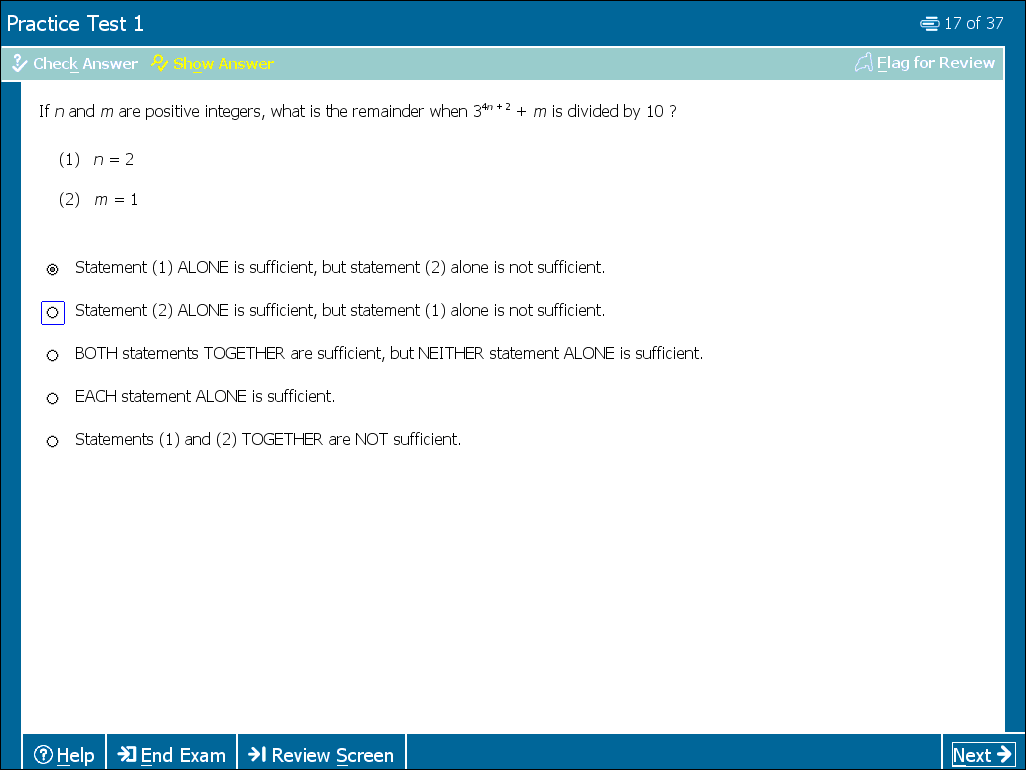Events & Promotions
|
|

GMAT Club Daily Prep
Thank you for using the timer - this advanced tool can estimate your performance and suggest more practice questions. We have subscribed you to Daily Prep Questions via email.
Customized
for You
Track
Your Progress
Practice
Pays
Not interested in getting valuable practice questions and articles delivered to your email? No problem, unsubscribe here.
- Nov 20
07:30 AM PST
-08:30 AM PST
Learn what truly sets the UC Riverside MBA apart and how it helps in your professional growth - Nov 22
11:00 AM IST
-01:00 PM IST
Do RC/MSR passages scare you? e-GMAT is conducting a masterclass to help you learn – Learn effective reading strategies Tackle difficult RC & MSR with confidence Excel in timed test environment - Nov 23
11:00 AM IST
-01:00 PM IST
Attend this free GMAT Algebra Webinar and learn how to master the most challenging Inequalities and Absolute Value problems with ease. - Nov 25
10:00 AM EST
-11:00 AM EST
Prefer video-based learning? The Target Test Prep OnDemand course is a one-of-a-kind video masterclass featuring 400 hours of lecture-style teaching by Scott Woodbury-Stewart, founder of Target Test Prep and one of the most accomplished GMAT instructors.
B
Be sure to select an answer first to save it in the Error Log before revealing the correct answer (OA)!
Difficulty:
 45%
(medium)
45%
(medium)
Question Stats:
64% (01:23) correct 36%
(01:28)
wrong
36%
(01:28)
wrong  based on 2563
sessions
based on 2563
sessions
History
Date
Time
Result
Not Attempted Yet
If n and m are positive integers, what is the remainder when \(3^{(4n+2)} + m\) is divided by 10?
(1) n = 2
(2) m = 1

5.gif [ 20.27 KiB | Viewed 20064 times ]
(1) n = 2
(2) m = 1
Attachment:
5.gif [ 20.27 KiB | Viewed 20064 times ]
Kudos
Bookmarks
Geronimo
When considering the remainder when a number is divided by 10, focus on the last digit of the number. That will be the remainder. e.g. 85/10, remainder 5. 39 divided by 10, remainder 9 etc...
The last digit of powers of 3 have a cyclicity of 4. Look at the example below:
3^1 = 3
3^2 = 9
3^ 3 = 27
3^4 = 81
3^5 = 243
3^6 = 729
and so on.. notice the last digits 3, 9, 7, 1, 3, 9,....
thats the pattern they follow.
So 3^(4n + 2) will end with 9. (If you are not comfortable with cyclicity, check out its theory. You can also check out this post where I have discussed cyclicity of some other numbers in detail: https://gmatclub.com/forum/cyclicity-of-103262.html#p803511)
Now, we just need to know what m is. If m = 1, 3^(4n + 2) + m will end in 0. So remainder will be 0.
Answer (B).
Kudos
Bookmarks
mads
1: not enough as we do not know what is m hence impossible to answer remainder.
2: 3 has a cylicity of 4 i.e
3^1 = 3
3^2 = 9
3^3 = 27
3^4 = 81
3^5 = 243
hence cyclicity of 4
for any +ve value of n (1,2,3,.....) the unit digit of 3^(4n+2) will be 9 hence adding m=1 into it will give unit digit as 0 which is divisible by 10 hence sufficient to answer.
Its B





 do not provide the answer before it is answered, nobody may attempt it. Give it a maximum of 2 days and provide the answer thereafter.
do not provide the answer before it is answered, nobody may attempt it. Give it a maximum of 2 days and provide the answer thereafter. 






